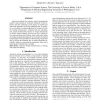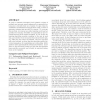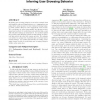801 search results - page 86 / 161 » The Inefficiency of Batch Training for Large Training Sets |
INTERSPEECH
2010
13 years 3 months ago
2010
Supervised methods for extractive speech summarization require a large training set. Summary annotation is often expensive and time consuming. In this paper, we exploit semisuperv...
KDD
2012
ACM
11 years 11 months ago
2012
ACM
In order to minimize redundancy and optimize coverage of multiple user interests, search engines and recommender systems aim to diversify their set of results. To date, these dive...
SIGIR
2012
ACM
11 years 11 months ago
2012
ACM
Modeling user browsing behavior is an active research area with tangible real-world applications, e.g., organizations can adapt their online presence to their visitors browsing be...
ECCV
2002
Springer
14 years 10 months ago
2002
Springer
Abstract. This paper addresses the problem of probabilistically modeling 3D human motion for synthesis and tracking. Given the high dimensional nature of human motion, learning an ...
BMCBI
2010
13 years 9 months ago
2010
Background: MHC class II binding predictions are widely used to identify epitope candidates in infectious agents, allergens, cancer and autoantigens. The vast majority of predicti...



